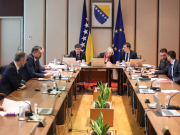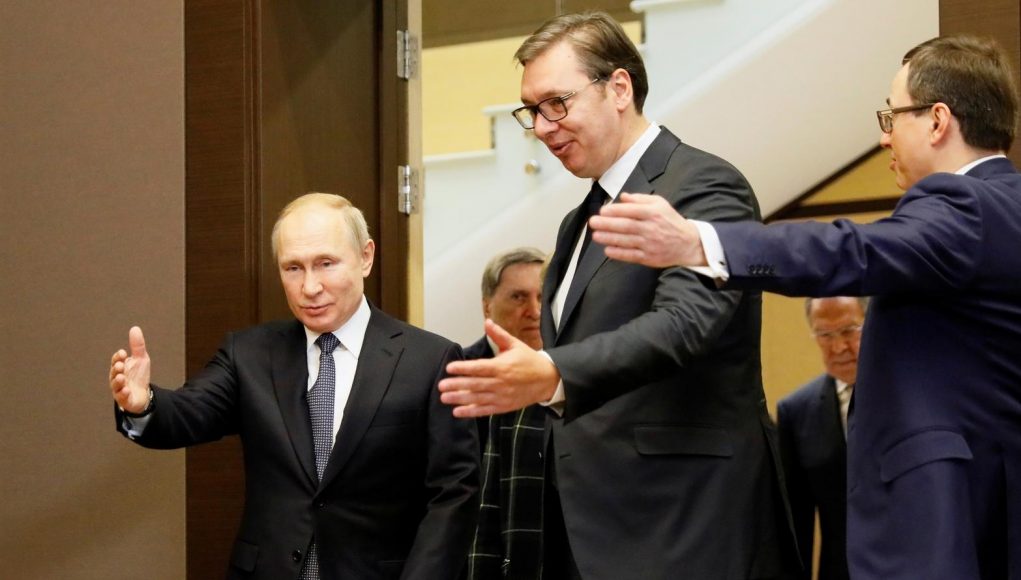Serbian President Aleksandar Vučić cannot disguise his support for imperial Russia. His meeting with Ukrainian President Volodymyr Zelenskyy at the Balkan Summit in Greece in August and the provision of some military hardware to Ukraine is supposed to demonstrate Serbia’s “balancing” between Russia and Ukraine. However, this posture only fools those in Washington and Brussels who want to be fooled and who believe that Vučić can be separated from Putin. In reality, Serbia’s regime fully supports Moscow’s imperial and genocidal objectives in Ukraine and its global anti-American policies.
Belgrade needs Russia to be a strong power with global reach to challenge American influence and back Serbia’s regional aspirations. Much of the political elite and substantial segments of society nurture grievances against the US and NATO for its military intervention over Kosova in 1999. For Vučić and his henchmen this was an unforgivable action that prevented his master Milošević from completing the murder and mass expulsion of Kosova’s Albanian majority.
Vučić met with Zelensky to convince him not to recognize Kosova, claiming that the situation is similar with Ukraine’s occupied territories. According to him, if Ukraine recognizes Kosova's independence, it would be a “huge blow” for both Serbia and Ukraine. However, Vučić the specialist in disinformation and hate speech from the 1990s, has the comparison between Ukraine and Serbia fully backward. While Kosova was liberated by NATO from Serbia and gained its independence to prevent genocide, Russia occupied Crimea, Donbas, and parts of two other Ukrainian regions in order to perpetrate genocide and eradicate Ukrainian identity.
A more compelling comparison for Vučić would be between Serbia and Russia. Russia’s colonial oppression of dozens of subject nations is similar to Belgrade’s suppression of Kosovar Albanians and its attempts to control Bosnia-Herzegovina and Montenegro. Hence, all the repressed republics currently trapped in the Russian Federation and facing forcible russification also need to be independent, including Chechnya, Ingushetia, Dagestan, Circassia, Kalmykia, Tatarstan, Bashkortostan, Sakha, Tuva, and Buryatia.
Vučić’s deceptions are transparent. His publicly expressed sympathies for Ukraine are bogus and opportunistic. His government has supported Russia’s imperialism since he came to power and actually strengthened its links with Putin’s Kremlin after Moscow’s full-scale invasion of Ukraine in February 2022. The evidence for Vucic’s pro-imperialism is overwhelming.
On the economic front, Belgrade has not imposed economic, financial, trade, or energy sanctions against Russia for its attack on Ukraine, despite pressures from the EU and US to comply with European policy. On the contrary, it continues to benefit from trade deals, investments, energy contracts, and official corruption with Moscow. Serbia has welcomed thousands of Russian immigrants many of whom are infected with anti-Ukrainian, anti-American, and anti-EU sentiments and back Serbia’s mini-imperialist agenda in the Balkans.
On the security front, Serbia continues to purchase an array of weapons from Russia and has strengthened its institutional and intelligence ties with Moscow. The joint espionage center in southern Serbia, couched as a “humanitarian” outpost, provides the Kremlin with intelligence on NATO and US forces in the region, helps train agents and saboteurs, prepares for broader regional destabilization, and deepens Serbia’s dependence on Russia.
In recent revelations, Serbian government agencies are also actively recruiting fighters for the war against Ukraine. According to French intelligence services, citing the Russian opposition, Moscow is hiring an initial batch of 500 Serbian private soldiers for immediate deployment in Ukraine. By the beginning of September they are scheduled to arrive at a temporary camp in the Moscow region and will consist of Serbs recruited from several Balkan states. Already, by mid-August fifty candidates were selected and brought to Russia in small groups by commercial flights under the guise of contracts with a construction company. The recruiters themselves were either involved in Milošević's special forces perpetrating genocide in Bosnia-Herzegovina and Kosova or fought with the Wagner group in Ukraine in 2014 and in Syria after 2016.
A “Serbian unit” is now being created as part of Russia’s 106th Guards Airborne Division. Whereas various foreign combatants are fighting to defend Ukraine against Russian imperialism, Serbia will have the only national military unit in occupied Ukraine, other than Kadyrov’s Chechens, who will be fighting for Russian imperialism. And unlike the Serbs, the pro-independence Chechens have their own battalions fighting alongside the Ukrainian army to oust the Russian invasion force. One has yet to find a Serb who is fighting for Ukraine to uphold the country’s independence.
US officials continue to naively placate the Vučić administration, which claims the independent state of Kosova as its imperial territory just as Russia claims Ukraine as its historical and cultural heritage. Such a short-sighted American approach does not pull Serbia away from Russia but simply emboldens Belgrade to threaten its neighbors more aggressively.
In recent weeks, the governments of Montenegro, North Macedonia, and Albania have all expressed concern after Miloš Vučević, Serbian Defense Minister and head of the ruling Serbian Progressive Party, asserted that their recognition of Kosova will come back to hurt them and they will be “hit on the head, just like Ukraine.” If such threats are not vigorously condemned by Washington and Brussels with demands that the culprit be removed from office then Vučić will conclude that he has received another green light for aggression.
Belgrade wants Russia to win the war against Ukraine and seize its territories for two core reasons. First, this would bolster Russia’s global stature in challenging American and European interests. And second, it will reinforce Serbia’s agenda to regain Kosova and dominate Bosnia-Herzegovina and Montenegro with intensified assistance from a more assertive Moscow. Vučić’scalculations make it even more imperative for the Western Balkans that Russia is comprehensively defeated in Ukraine.
(Janusz Bugajski is a Senior Fellow at the Jamestown Foundation in Washington DC. His recent book is Failed State: A Guide to Russia’s Rupture. His forthcoming book is titled Pivotal Poland: Europe’s Rising Strategic Player)
































